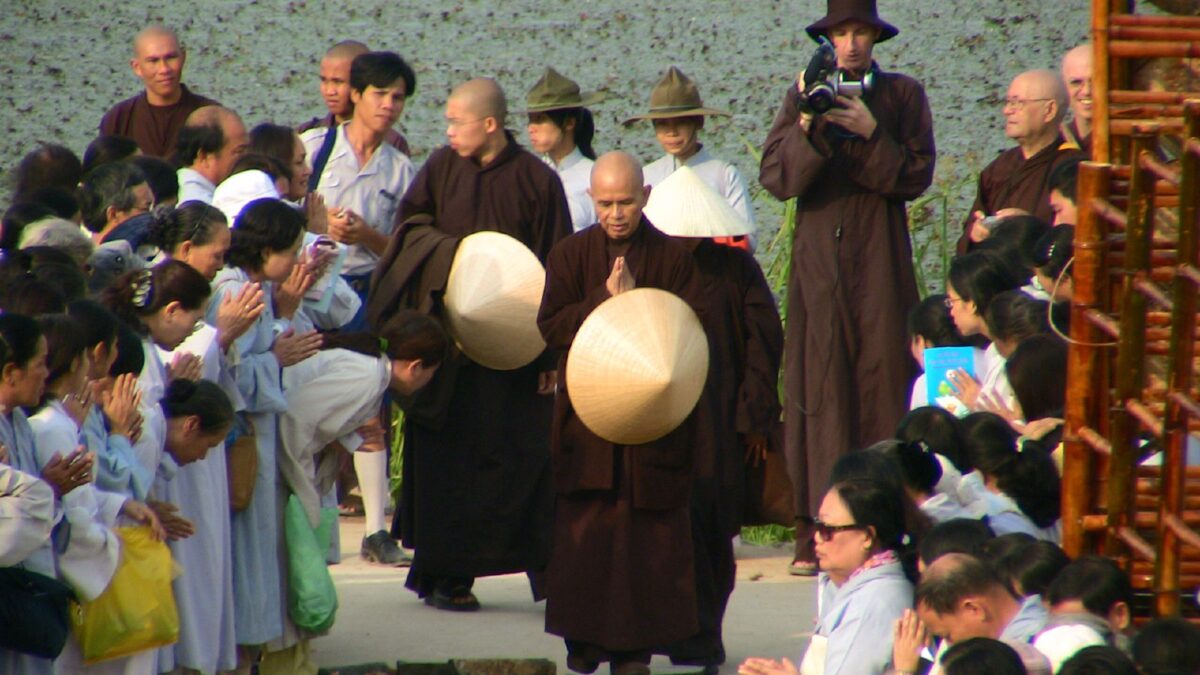Thich Nhat Hanh in Vietnam, 2007. d nelson via Wikimedia Commons.
Buddhist Studies Workshop with Alec Soucy
Speaker: Alec Soucy
Date: April 15, 2024, 4:30 pm – 6:00 pm
Location: Princeton University, 1879 Hall
Abstract:
Before Thích Nhất Hạnh was exiled from Vietnam in 1966, he was relatively unknown. He served as the editor for an important Buddhist journal in the 1950s, to which he was a prolific contributor. Several of the articles were even collected and published as books in the latter 1950s. However, his use of pseudonyms in his publications at this time meant that he remained a little-known figure. Through the 1960s, there was a mass Buddhist activist movement in South Vietnam, but despite his renown as the inventor of the term “engaged Buddhism” he was not active in this movement and was not a public leader. He may have remained in obscurity had it not been for his encounter with prominent spokespeople of the American peace movement, particularly Alfred Hassler from the Fellowship of Reconciliation. This paper will look at the relationship between Thích Nhất Hạnh and the peace movement in the West and will show how this connection was behind his rise to international prominence.
About the speaker:
 Alexander Soucy is a Professor and Chair of the Department of Religious Studies at Saint Mary’s University (Halifax, Canada). He has lived in Hanoi, Vietnam for more than four years where he did his doctoral research and later worked as a consultant in international development. He has continued to do periodic fieldwork in Vietnam since the late 1990s and has conducted interviews and engaged in participant observation in Vietnamese communities throughout Canada, the United States, Europe and Australia. His first monograph, The Buddha Side: Gender, Power and Buddhist Practice in Vietnam (2012, University of Hawai’i Press) was the first English-language ethnography of Vietnamese Buddhism. His most recent work, Zen Conquests: Buddhist Transformations in Contemporary Vietnam (2022, University of Hawai’i Press), continues this ethnographic approach while also taking into account the globalization of Buddhism. He has co-edited two volumes on Buddhism in Canada, Wild Geese: Buddhism in Canada (2010) and Flowers on the Rock: Global and Local Buddhisms in Canada (2014), and a volume on Buddhism and globalization, called Buddhism in the Global Eye: Beyond East and West. He has published a number of essays on Vietnamese Buddhism in Vietnam and in the West in Religious Studies and Anthropology journals, such as The Journal of the American Academy of Religion, Studies in Religion, Anthropological Forum; The Asia Pacific Journal of Anthropology, Contemporary Buddhism, and in various collected works. His current researcg will result in a monograph-length work that will contextualize the life of Thich Nhat Hanh within the context of the developments of Buddhism in Vitnam in the last century, and the globalization of Buddhism more generally.
Alexander Soucy is a Professor and Chair of the Department of Religious Studies at Saint Mary’s University (Halifax, Canada). He has lived in Hanoi, Vietnam for more than four years where he did his doctoral research and later worked as a consultant in international development. He has continued to do periodic fieldwork in Vietnam since the late 1990s and has conducted interviews and engaged in participant observation in Vietnamese communities throughout Canada, the United States, Europe and Australia. His first monograph, The Buddha Side: Gender, Power and Buddhist Practice in Vietnam (2012, University of Hawai’i Press) was the first English-language ethnography of Vietnamese Buddhism. His most recent work, Zen Conquests: Buddhist Transformations in Contemporary Vietnam (2022, University of Hawai’i Press), continues this ethnographic approach while also taking into account the globalization of Buddhism. He has co-edited two volumes on Buddhism in Canada, Wild Geese: Buddhism in Canada (2010) and Flowers on the Rock: Global and Local Buddhisms in Canada (2014), and a volume on Buddhism and globalization, called Buddhism in the Global Eye: Beyond East and West. He has published a number of essays on Vietnamese Buddhism in Vietnam and in the West in Religious Studies and Anthropology journals, such as The Journal of the American Academy of Religion, Studies in Religion, Anthropological Forum; The Asia Pacific Journal of Anthropology, Contemporary Buddhism, and in various collected works. His current researcg will result in a monograph-length work that will contextualize the life of Thich Nhat Hanh within the context of the developments of Buddhism in Vitnam in the last century, and the globalization of Buddhism more generally.
Registration is required to attend the event. Click to register.

